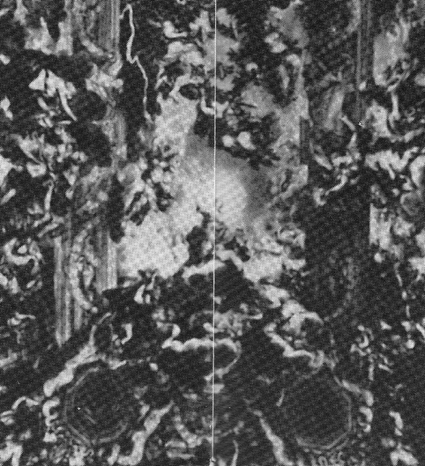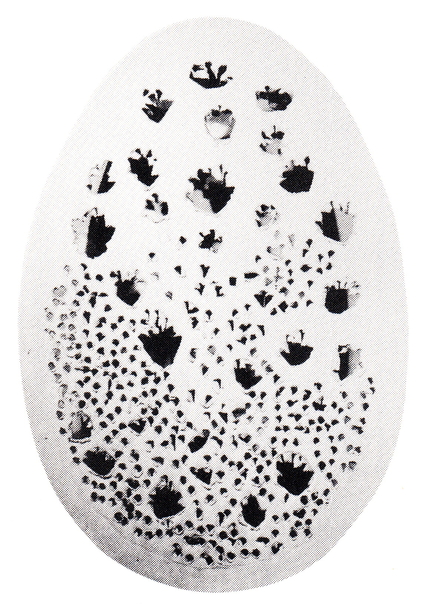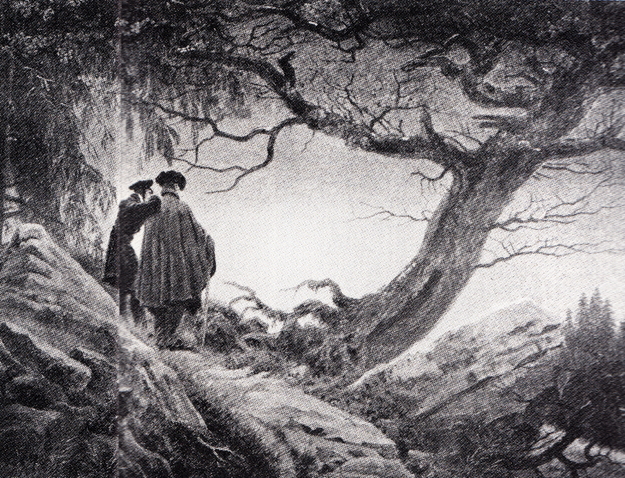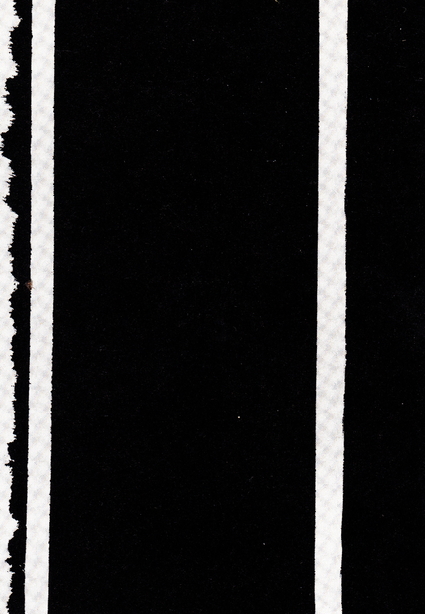- Testbeeld is a Dutch word, literally meaning test image. Our English translator proposed the BBC-approved test card, but the author prefered the more electronic, American term test pattern. We apologise to our UK readership for this insult to British TV history.
He realizes that his form is reflected in the TV set he is watching. Hypnotized in an endless trance, the one image no longer knows what the other one depicts, its origins and outcome are inextricably jumbled together. It's SAMUEL BECKETT's The Unnamable incorporated (for as long as we watch him) Into an everyday image of BUDDHA. One product in an endless series, each interchangeable for another. I, of whom I know nothing. I know my eyes are open, because of the tears that pour from them unceasingly, I know I am seated, my hand on my knees, because of the pressure against my rump, against the soles of my feet, against the palms of my hands, against my knees. Against my palms the pressure is of my knees, against my knees of my palms, but what is it that presses against my rump, against the soles of my feet? I don't know (... ) But what makes me say I gaze straight before me as I have said.
How long has the BUDDHA been gazing so unremittingly at his own image and likeness? And why do we find that eternal image of the Eastern NARCISSUS so intermittently fascinating? Sometimes I think that the reason I like looking at the test pattern for such long periods of time is not because of what I see but to match myself against the BUDDHA's imperturbable demeanour in a spiritual competition with a foregone conclusion. Because whatever program I watch, no image can in itself approach the BUDDHA's engagement as effectively as the continuous, persistent meditation of the test pattern.
A succession of test patterns used over the years can provide us with an exact picture of the possibilities viewers have at their disposal for the optimal emulation of the BUDDHA's ideal so perfectly expressed by PAIK: a lifelong meditation of its own mirror image. Extraordinary fascinating and contagious - although the changes in form and structure, specification and details of the successive test patterns were simply an expression of the advancing science of the electronic screen. And where the BUDDHA must come to an understanding with his own mirror image, we can actually surpass him in our aesthetic meditative contemplations that are incorporated into the average TV test pattern. Because just how many centuries of artistic development have been invested into that card, banal though it at first may seem. Indeed, it must be quite clear to those who believe in the development of artistic thinking and in a progressive development (with abstract art forming a tentative zenith to our century) that the test pattern signifies the ultimate step in this process. Without PICASSO and MONDRIAAN there would be no test pattern structures and without the statements of APOLLINAIRE and GREENBERG there would be no understanding of the strongly transcendental and mystical character inherent to this formulation. The American art critic CLEMENT GREENBERG has had a singularly far-reaching influence on our experience of the test pattern with his ideas that the art work need have absolutely no connection with a world outside and may relate purely and simply to its component parts and itself. Because assuming that (unlike BUDDHA) we are incapable of constantly enduring our own mirror image, we can then as an alternative familiarize ourselves with that modernist way of looking that enables us to enter into a unique and mystical relation with the test pattern.
That the test pattern has played such an important role is in part due to the unrivalled influence that GREENBERG's visual theories have had on the post-war artistic world. For that matter, GREENBERG's essays (Art & Culture BEACON PRESS Boston 1961) have also exerted a radical influence on the test pattern's definitive form. Just open the book at any page and one's eye is caught by a passage that can serve both as description and definition of the character of our test patterns: The new construction - sculpture points back, almost insistently, to its origins in Cubist painting: by its linearism and linear intricacies, by its openness and transparency and weightlessness, and by its preoccupation with the surface as skin alone (...). Space is there to be shaped, divided, enclosed, but not to be filled.
Hence, the test pattern is the ultimate illustration of GREENBERG's ideal, the most convincing and constant image that even now, against all criticism, propagates his beliefs. Tried and tested, used and abused by electronics industry's laboratories and workshops, by fitters and TV consumers as the touchstone for colors and lines, it has had an influence surpassed by nothing and no one on the visual imagination of public opinion. And this still holds true although technical progress and an abundance of channels and 24 hour broadcasting have created a crisis in.the use of test patterns.
Television is virtual death, because if we watch television we don't develop. (PAUL VIRILLO ).
Test patterns are nothing other than images that make a gift out of the deferment of life. These are the pictures that make us step out of our personal identities and stop acting our age. Their constant emanation brings our lives to a standstill and summons a state similar to death. Not our death as beings, but the simulated death of our consciousness so that we can freely surrender to the mystical death that is the essence of the experiencing art. Test patterns are the absolute indicators for aesthetic and mystical experience just as once the stained glass windows of great cathedrals were in times past: an experience which via painting, ultimately reached a temporary apogee by means of the electronic structures of TV test patterns. What is particularly interesting is that high-speed electronic signals allow us to create an image which should actually produce the most static results possible.
The absolute stillness suggested by a complex combination of digital sequences.
Gradually test patterns (which were originally intended to facilitate the constructing and adjusting of television sets) have developed into the ultimate metaphor that appears to reconcile us with death. But hypnotic though their effect may be, they express not only the mystical side but also its antithesis. The test pattern is equally the evil eye that focuses. on us and seeks out the germs of disease and decay in our living flesh. Because while we do our utmost to experience the simulated death of the test pattern, it is involved in a completely different game and in its way attempts to exact revenge. In crossing the border between life and death it forces our consciousness into a compulsory corset of time, hypnotizes us and reflects the omnipresence of death in life as being a splendid reality. The evil eye's morbid game with death slowly invades our bodies and makes us the victims of its brutality. Although we are spellbound, hypnotized by its fascination, the test pattern is also fascinated by the beauty of our slowly decomposing flesh. In time, the brutality of this ritual becomes unbearable, it is expressed by the tired look in our eyes.
Beyond the horizon of this death, finally the image of resurrection appears. NAM JUNE PAIK's TV BUDDHA is perhaps the most interesting embodiment of this. This is the figure that surpassed all human relations and yet has completely withdrawn into the human. He is the ultimate BUDDHA, he is the ultimate test pattern that has incorporated the Divine into the human and possesses the human in the Divine. The stone inertia of his body is also the source of hardcore energy. His manifestation unites antitheses. In contemplating himself on the screen, he proves that the test pattern is nothing other than our own mirroring. The image that is enough in itself questions our absence in his presence but equally our absence is the proof of presence.
In the development of his robot family, PAIK has turned the test pattern inside out, back to front, upside down and by acceleration has challenged it into rhythmic pirouettes. Past the fragments of the implosion, the test pattern leaves its own borders and limitations in order to merge in the alluring, artistic and narrative mirages. Separated from the seemingly innocent, simple, geometric figuration of the first generation of test patterns, this rigid construction balloons out in all directions into a rampant narrative multiplicity. The character of the presentation is a definite departure from the tight and tortuous structure of the classical test pattern and shows how this narrative idea will define the test patterns of the future.
PAIK's test patterns have definitely deconstructed the Greenbergian structure by pulling apart the supposedly transcendent structure of the self-involved materiality of light and by re-importing literary experience. PAIK's robot family has transformed the test pattern's role as checker into that of amuser. The classical trinity reason, conscience and morality - the means for order and judgement that were the test pattern's raison d'ȇtre- have been merged into the literary caroussel of post-modern viewing and experience. This results in an incessant flood of transforming and ever-changing images of a personal nature. Alterations in style and form leave only incoherent memories of the original test pattern. Once there were ultra-sensitive fields that could produce radical changes in consciousness (if you were exposed to them long enough). Now these sources of energy have escaped and have been released in a profusion of images and uncoordinated material.
Het Gotische TLD
Here the secret is concealed in light, the screen's radiating light that reflects the essence and symbolism of the light of the Divine. The transcendental Sendelicht, the presence of the Divine, is as much transcendental as the expression of an everyday physical phenomenon. As spiritual essence, as form and color without shadows, it is an image of GOD yet in light and dark, light and shadows it is simply a banal structure of electronic lines. GOD is light. In him we find no darkness, says ST. JOHN. Deus Lux est.
Of course, it is in DANTE that we can find the most lofty description of the test pattern's light: O highest light: sublime above Mankind, provide my eyes once more with beauty.

The Baroque Test Pattern
A world of lascivious and develish forms, a distorting mirror, an assault of beauty and perfection in the monstrous boudoirs of art and religion. A sign that is not false but simply absurd in its extravagance of production, its excess of over-aesthetizing and transported sensitivity in order to evoke the absolute opposite of the religious ecstacy of the Gothic reflection. It is a hoax. However, a profane content is concealed in its artistic and religious aura that intends the opposite of what it presents. Empty voids. An abrupt and asymetrical break which is effected by means of the bizarre utterances associated in form with mystic inclinations in order to provide the evil eye with the opportunity to reveal itself.

Transparency
The image hovers, we see KOENINGS and JANSMA, a hand with a piece of blue chalk that chalks the end of a billiard's cue; a mouth with red lipstick, a face with painted lips. The image is projected as a loop on a piece of sandblasted glass in the space, it has detached itself, it is transparent and moves like a fluttering flag in the space. The glass dissolves into the image of the film like sugar in tea. Red and blue break loose from the
background, they absorb the image, finally the image itself disappears in the endless
repetition of its own existence. A double victim of visual noise.
Hypnose
Night is the most appropriate time for the test pattern's selfhypnosis, like a NARCISSUS fascinated by its own image (and related to THANATOS, the death, and NUX, the night). It is then that the viewers sleep the sleep of the dead and the screen flickers with tiny variations, letting itself slide into its own thoughts in a seemingly endless dream, completely self-absorbed. The test pattern imagines itself as a transvestite in front of a mirror and whoever is secretly watching is sucked into this selfhypnosis, as if in ZEN meditation. Don't do anything, don't think anything coherent, don't expect anything and everything will just happen by itself.

Technical Difficulty
It has already been noted that in GEORGE BRAQUE's 1940s studio paintings the dark earth colours with with he painted his studio come across like a television screen gone wrong(P. HEYNEN). Hence, here too, KLASHORST's paintings provide a somewhat
confusing link between the traditional landscape (mixed with the human nude) and a
suggestion of a bright, badly adjusted television screen on the blink. These paintings are like 19th century pictures placed in a contemporary trend but constantly threatened by
transmitter disturbances. They are not simply reminiscent of the vibrating sensations that
CEZANNE considered necessary for modern painting but in their hyper-nervous, goading paint strokes they are directly indebted to the disordered structures of TV screen on the blink. Because apart from the fact that they remind us of how glorious Art once was (and here with particular reference to the French 18th century grand still and the avant-garde impressions of the 19th), they also submit us to the destruction of all the traditional laws of beauty such as the paranoid situation of the test pattern in painting.

Dr. Caligari/’s Test Pattern
The test pattern as touchstone for the moral behaviour of the viewer. We watch and become like innocent, malleable sleepwalkers in the hands of the charismatic image that observes and obsesses us.
The light blue eyes, in that eternal electronic tension. They are- the-hypnotizers ... I-am-the-victim ... they-have-all-the-answers ... I-have-nothing-to-say ... they-commit-themselves ... I-take-no-sides ... they-se-duce ... I-refuse ... They-go-there ... I-stay here... (ACCONCI)

Hallucinating Tests
The invisible White Noise turns a man into a sleepwalker so that then the test patterns can take us to task. Individual cerebral functions have submitted to external dictates. All the sirens, all the radio and TV waves, all the applications of ultrasound and microwave, all the radio links, all the secret codes and de-codes stimulate a depersonalized spiritual state in the viewer. Borne by countless waves that flow through us in this invisible field of electro-magnetic forces, we are merely an instrument in the hands of a control addict (WILLIAM BURROUGHS) who uses our needs to satisfy his obsession with power.

The Cosmetic Test Pattern
MAX HEADROOM's face looks as if it is built out of test patterns. Elastic as an inflated balloon, opened up and fixed by digital skin transplantations, he forms the ideal test pattern for skin fetishists. MICHAEL JACKSON, the ultimate performer, speaks a language that leaves the abstract designers' program miles behind in movement and noise but is hardly insensitive despite the fact that it is tangibly overwhelming.

Explosion
The glass screen, blown to pieces by the explosive power and extreme concentration of a short circuit, is now subjected to a continuing metamorphosis. On the whole we hear nothing more of it but sometimes there is an unsuspected power at work on
the old material which creates a glassy second phase. Here, in PIETER HEYNEN's Beeswax Screen, we suddenly see beeswax. A basic, natural apotheosis that forever returns the image to an innocent prehistory.

Abyss
The sublime, a screen color, the expression of a celestial blue fastened to a fragile support, the abyss is immediately behind that deepest experience. There is nothing hidden here, a knife would be superfluous. Walking a tightrope, the wild zips are balancing like tornados across the field. In this area of illusion, vertigo and whirl entice our gaze across the border.

The Hole as Test Pattern
The paintings of CASPAR DAVID FRIEDRICH, with the hole in the image, as if of: The one, awesome, true moment; the moment of absolute happiness, the absolute pain, the absolute desolation, the absolute connection, the moment when GOD completely reveals himself. (JOOST NIEMöLLER). FRIEDRICH knew that the image had to be broken through (a visual hole in the painting) like a ship run aground at the North Pool, foundered on the drifting ice floes. A clear prelude to a breakthrough in the field of vision. For almost a century the fragments of the broken screen have been trapped within the floes, drifting towards the Pool.
Waiting for a decisive step into the abyss behind the screen. The incredible boundlessness of the space he sought becomes visible like the edge of an abyss, right in the shadow of the floes in that infinitesimal distance between fullness and complete emptiness, that feverish motion which typifies all mystical art. It is as if the instant of the short circuit is caught forever in an eternal moment.

If you'd like to quote something: Groot, Pauk. "Testbeeld / Pattern / Card." Mediamatic Magazine vol. # 1 (1988).
Translation: Annie Wright